Corporation Law: Detailed Analysis of R v Rivkin Insider Trading Case
VerifiedAdded on 2023/06/05
|7
|2496
|475
Report
AI Summary
This report provides a comprehensive analysis of the landmark case of R v Rivkin [2002] NSWSC 1182, the first insider trading case in Australia. It examines the facts of the case, where Mr. Rivkin was found guilty of contravening the Corporations Act by trading Qantas shares based on non-public information. The report details the duties breached by Mr. Rivkin, including misleading statements and failure to fulfill director responsibilities as per Section 184 of the Corporations Act. The analysis includes the court's decision, which upheld the conviction, and discusses the impact of the case on Australian companies, emphasizing the importance of corporate governance, ethical conduct, and the proper handling of confidential information. The report concludes by highlighting the significance of the R v Rivkin case in shaping the understanding and enforcement of insider trading regulations and the duties of corporate directors.
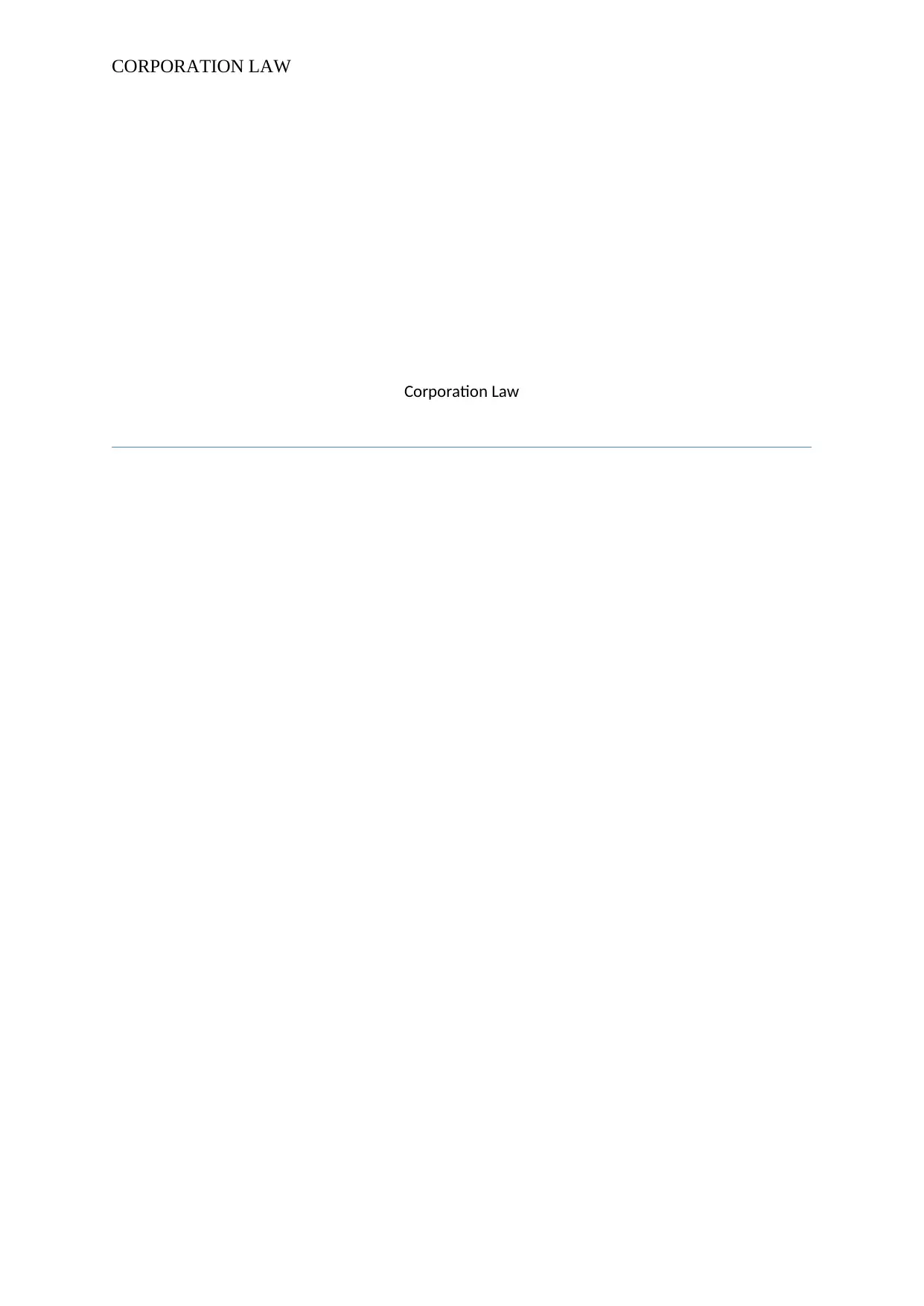
CORPORATION LAW
Corporation Law
Corporation Law
Paraphrase This Document
Need a fresh take? Get an instant paraphrase of this document with our AI Paraphraser
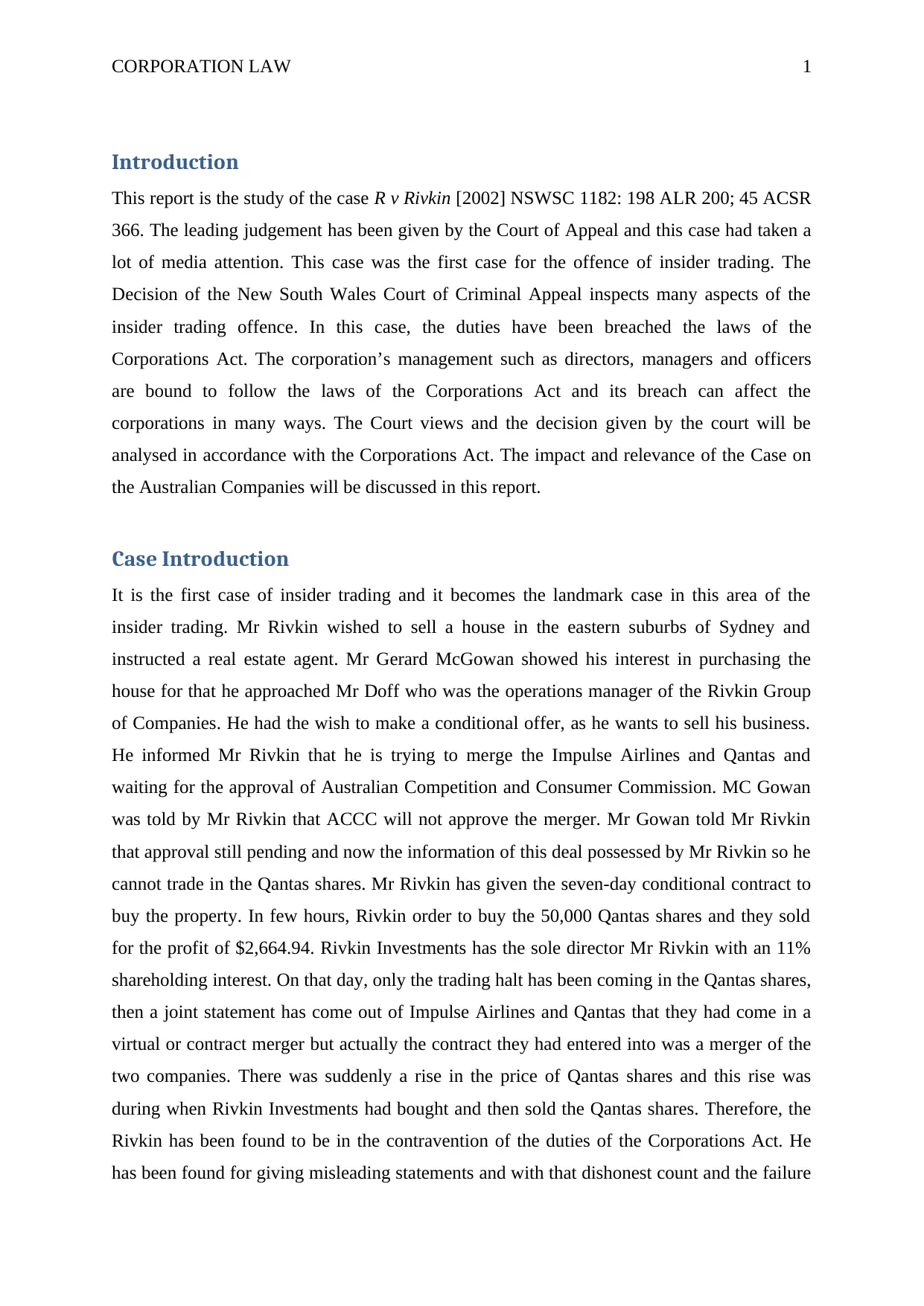
CORPORATION LAW 1
Introduction
This report is the study of the case R v Rivkin [2002] NSWSC 1182: 198 ALR 200; 45 ACSR
366. The leading judgement has been given by the Court of Appeal and this case had taken a
lot of media attention. This case was the first case for the offence of insider trading. The
Decision of the New South Wales Court of Criminal Appeal inspects many aspects of the
insider trading offence. In this case, the duties have been breached the laws of the
Corporations Act. The corporation’s management such as directors, managers and officers
are bound to follow the laws of the Corporations Act and its breach can affect the
corporations in many ways. The Court views and the decision given by the court will be
analysed in accordance with the Corporations Act. The impact and relevance of the Case on
the Australian Companies will be discussed in this report.
Case Introduction
It is the first case of insider trading and it becomes the landmark case in this area of the
insider trading. Mr Rivkin wished to sell a house in the eastern suburbs of Sydney and
instructed a real estate agent. Mr Gerard McGowan showed his interest in purchasing the
house for that he approached Mr Doff who was the operations manager of the Rivkin Group
of Companies. He had the wish to make a conditional offer, as he wants to sell his business.
He informed Mr Rivkin that he is trying to merge the Impulse Airlines and Qantas and
waiting for the approval of Australian Competition and Consumer Commission. MC Gowan
was told by Mr Rivkin that ACCC will not approve the merger. Mr Gowan told Mr Rivkin
that approval still pending and now the information of this deal possessed by Mr Rivkin so he
cannot trade in the Qantas shares. Mr Rivkin has given the seven-day conditional contract to
buy the property. In few hours, Rivkin order to buy the 50,000 Qantas shares and they sold
for the profit of $2,664.94. Rivkin Investments has the sole director Mr Rivkin with an 11%
shareholding interest. On that day, only the trading halt has been coming in the Qantas shares,
then a joint statement has come out of Impulse Airlines and Qantas that they had come in a
virtual or contract merger but actually the contract they had entered into was a merger of the
two companies. There was suddenly a rise in the price of Qantas shares and this rise was
during when Rivkin Investments had bought and then sold the Qantas shares. Therefore, the
Rivkin has been found to be in the contravention of the duties of the Corporations Act. He
has been found for giving misleading statements and with that dishonest count and the failure
Introduction
This report is the study of the case R v Rivkin [2002] NSWSC 1182: 198 ALR 200; 45 ACSR
366. The leading judgement has been given by the Court of Appeal and this case had taken a
lot of media attention. This case was the first case for the offence of insider trading. The
Decision of the New South Wales Court of Criminal Appeal inspects many aspects of the
insider trading offence. In this case, the duties have been breached the laws of the
Corporations Act. The corporation’s management such as directors, managers and officers
are bound to follow the laws of the Corporations Act and its breach can affect the
corporations in many ways. The Court views and the decision given by the court will be
analysed in accordance with the Corporations Act. The impact and relevance of the Case on
the Australian Companies will be discussed in this report.
Case Introduction
It is the first case of insider trading and it becomes the landmark case in this area of the
insider trading. Mr Rivkin wished to sell a house in the eastern suburbs of Sydney and
instructed a real estate agent. Mr Gerard McGowan showed his interest in purchasing the
house for that he approached Mr Doff who was the operations manager of the Rivkin Group
of Companies. He had the wish to make a conditional offer, as he wants to sell his business.
He informed Mr Rivkin that he is trying to merge the Impulse Airlines and Qantas and
waiting for the approval of Australian Competition and Consumer Commission. MC Gowan
was told by Mr Rivkin that ACCC will not approve the merger. Mr Gowan told Mr Rivkin
that approval still pending and now the information of this deal possessed by Mr Rivkin so he
cannot trade in the Qantas shares. Mr Rivkin has given the seven-day conditional contract to
buy the property. In few hours, Rivkin order to buy the 50,000 Qantas shares and they sold
for the profit of $2,664.94. Rivkin Investments has the sole director Mr Rivkin with an 11%
shareholding interest. On that day, only the trading halt has been coming in the Qantas shares,
then a joint statement has come out of Impulse Airlines and Qantas that they had come in a
virtual or contract merger but actually the contract they had entered into was a merger of the
two companies. There was suddenly a rise in the price of Qantas shares and this rise was
during when Rivkin Investments had bought and then sold the Qantas shares. Therefore, the
Rivkin has been found to be in the contravention of the duties of the Corporations Act. He
has been found for giving misleading statements and with that dishonest count and the failure
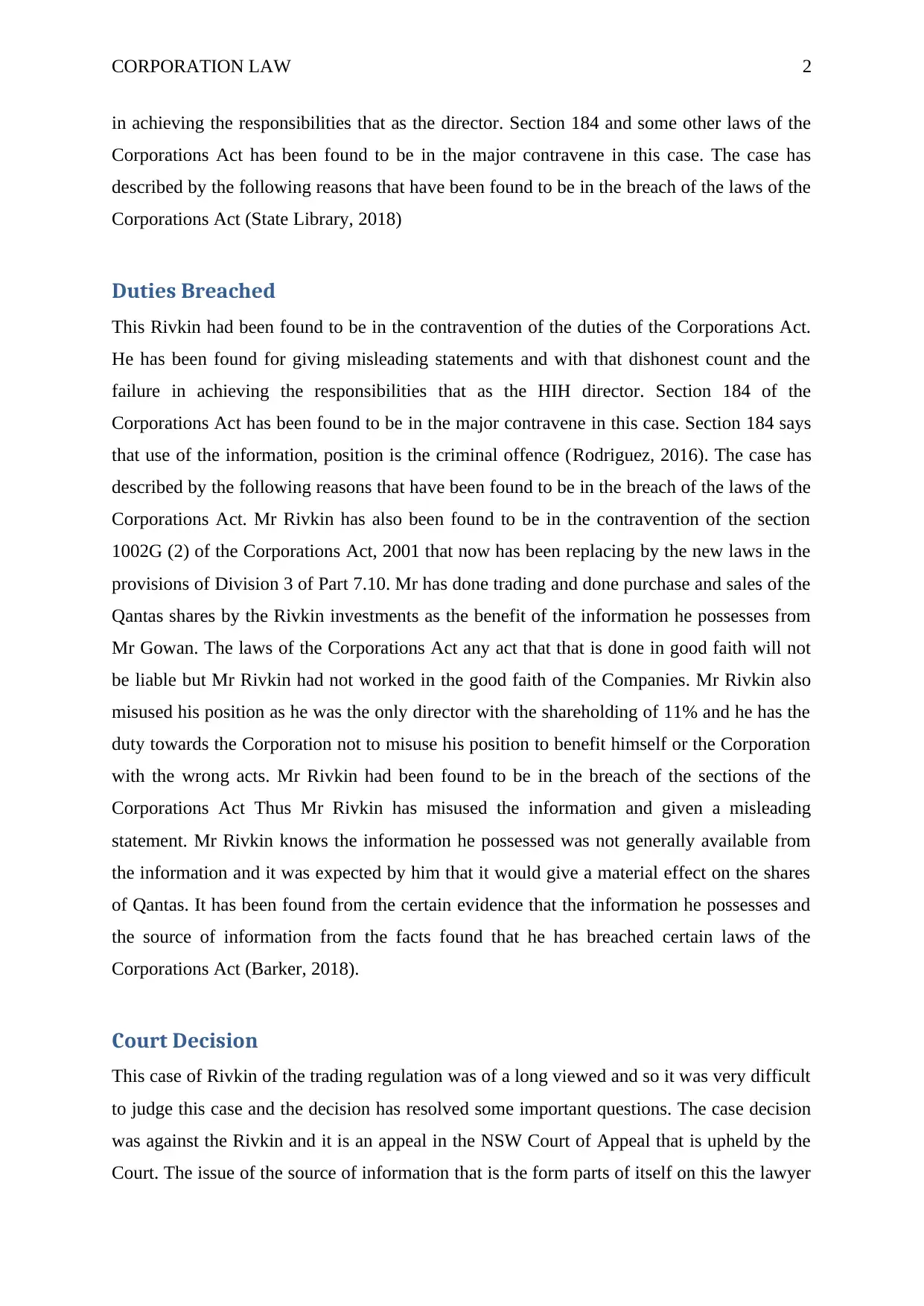
CORPORATION LAW 2
in achieving the responsibilities that as the director. Section 184 and some other laws of the
Corporations Act has been found to be in the major contravene in this case. The case has
described by the following reasons that have been found to be in the breach of the laws of the
Corporations Act (State Library, 2018)
Duties Breached
This Rivkin had been found to be in the contravention of the duties of the Corporations Act.
He has been found for giving misleading statements and with that dishonest count and the
failure in achieving the responsibilities that as the HIH director. Section 184 of the
Corporations Act has been found to be in the major contravene in this case. Section 184 says
that use of the information, position is the criminal offence (Rodriguez, 2016). The case has
described by the following reasons that have been found to be in the breach of the laws of the
Corporations Act. Mr Rivkin has also been found to be in the contravention of the section
1002G (2) of the Corporations Act, 2001 that now has been replacing by the new laws in the
provisions of Division 3 of Part 7.10. Mr has done trading and done purchase and sales of the
Qantas shares by the Rivkin investments as the benefit of the information he possesses from
Mr Gowan. The laws of the Corporations Act any act that that is done in good faith will not
be liable but Mr Rivkin had not worked in the good faith of the Companies. Mr Rivkin also
misused his position as he was the only director with the shareholding of 11% and he has the
duty towards the Corporation not to misuse his position to benefit himself or the Corporation
with the wrong acts. Mr Rivkin had been found to be in the breach of the sections of the
Corporations Act Thus Mr Rivkin has misused the information and given a misleading
statement. Mr Rivkin knows the information he possessed was not generally available from
the information and it was expected by him that it would give a material effect on the shares
of Qantas. It has been found from the certain evidence that the information he possesses and
the source of information from the facts found that he has breached certain laws of the
Corporations Act (Barker, 2018).
Court Decision
This case of Rivkin of the trading regulation was of a long viewed and so it was very difficult
to judge this case and the decision has resolved some important questions. The case decision
was against the Rivkin and it is an appeal in the NSW Court of Appeal that is upheld by the
Court. The issue of the source of information that is the form parts of itself on this the lawyer
in achieving the responsibilities that as the director. Section 184 and some other laws of the
Corporations Act has been found to be in the major contravene in this case. The case has
described by the following reasons that have been found to be in the breach of the laws of the
Corporations Act (State Library, 2018)
Duties Breached
This Rivkin had been found to be in the contravention of the duties of the Corporations Act.
He has been found for giving misleading statements and with that dishonest count and the
failure in achieving the responsibilities that as the HIH director. Section 184 of the
Corporations Act has been found to be in the major contravene in this case. Section 184 says
that use of the information, position is the criminal offence (Rodriguez, 2016). The case has
described by the following reasons that have been found to be in the breach of the laws of the
Corporations Act. Mr Rivkin has also been found to be in the contravention of the section
1002G (2) of the Corporations Act, 2001 that now has been replacing by the new laws in the
provisions of Division 3 of Part 7.10. Mr has done trading and done purchase and sales of the
Qantas shares by the Rivkin investments as the benefit of the information he possesses from
Mr Gowan. The laws of the Corporations Act any act that that is done in good faith will not
be liable but Mr Rivkin had not worked in the good faith of the Companies. Mr Rivkin also
misused his position as he was the only director with the shareholding of 11% and he has the
duty towards the Corporation not to misuse his position to benefit himself or the Corporation
with the wrong acts. Mr Rivkin had been found to be in the breach of the sections of the
Corporations Act Thus Mr Rivkin has misused the information and given a misleading
statement. Mr Rivkin knows the information he possessed was not generally available from
the information and it was expected by him that it would give a material effect on the shares
of Qantas. It has been found from the certain evidence that the information he possesses and
the source of information from the facts found that he has breached certain laws of the
Corporations Act (Barker, 2018).
Court Decision
This case of Rivkin of the trading regulation was of a long viewed and so it was very difficult
to judge this case and the decision has resolved some important questions. The case decision
was against the Rivkin and it is an appeal in the NSW Court of Appeal that is upheld by the
Court. The issue of the source of information that is the form parts of itself on this the lawyer
⊘ This is a preview!⊘
Do you want full access?
Subscribe today to unlock all pages.

Trusted by 1+ million students worldwide
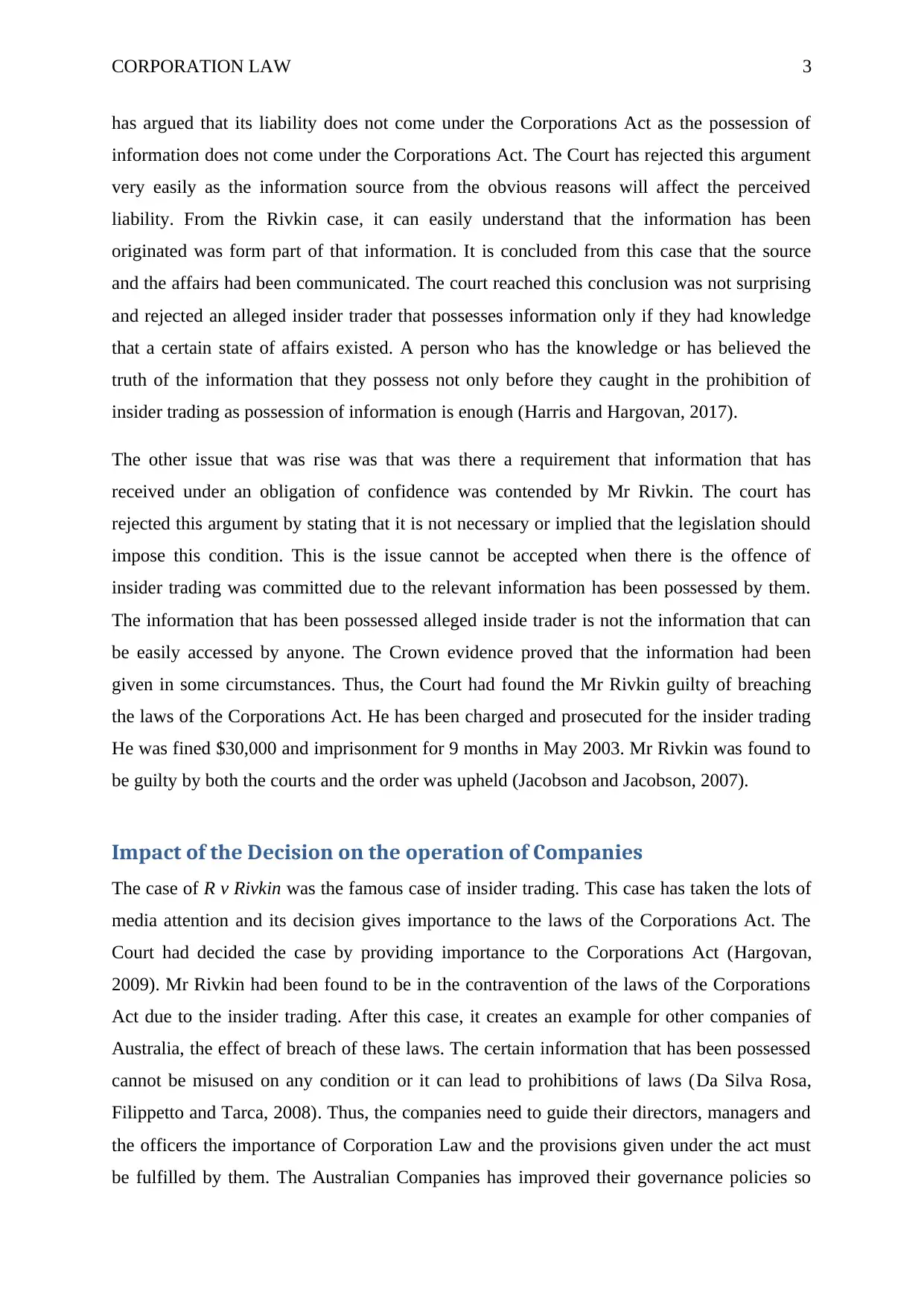
CORPORATION LAW 3
has argued that its liability does not come under the Corporations Act as the possession of
information does not come under the Corporations Act. The Court has rejected this argument
very easily as the information source from the obvious reasons will affect the perceived
liability. From the Rivkin case, it can easily understand that the information has been
originated was form part of that information. It is concluded from this case that the source
and the affairs had been communicated. The court reached this conclusion was not surprising
and rejected an alleged insider trader that possesses information only if they had knowledge
that a certain state of affairs existed. A person who has the knowledge or has believed the
truth of the information that they possess not only before they caught in the prohibition of
insider trading as possession of information is enough (Harris and Hargovan, 2017).
The other issue that was rise was that was there a requirement that information that has
received under an obligation of confidence was contended by Mr Rivkin. The court has
rejected this argument by stating that it is not necessary or implied that the legislation should
impose this condition. This is the issue cannot be accepted when there is the offence of
insider trading was committed due to the relevant information has been possessed by them.
The information that has been possessed alleged inside trader is not the information that can
be easily accessed by anyone. The Crown evidence proved that the information had been
given in some circumstances. Thus, the Court had found the Mr Rivkin guilty of breaching
the laws of the Corporations Act. He has been charged and prosecuted for the insider trading
He was fined $30,000 and imprisonment for 9 months in May 2003. Mr Rivkin was found to
be guilty by both the courts and the order was upheld (Jacobson and Jacobson, 2007).
Impact of the Decision on the operation of Companies
The case of R v Rivkin was the famous case of insider trading. This case has taken the lots of
media attention and its decision gives importance to the laws of the Corporations Act. The
Court had decided the case by providing importance to the Corporations Act (Hargovan,
2009). Mr Rivkin had been found to be in the contravention of the laws of the Corporations
Act due to the insider trading. After this case, it creates an example for other companies of
Australia, the effect of breach of these laws. The certain information that has been possessed
cannot be misused on any condition or it can lead to prohibitions of laws (Da Silva Rosa,
Filippetto and Tarca, 2008). Thus, the companies need to guide their directors, managers and
the officers the importance of Corporation Law and the provisions given under the act must
be fulfilled by them. The Australian Companies has improved their governance policies so
has argued that its liability does not come under the Corporations Act as the possession of
information does not come under the Corporations Act. The Court has rejected this argument
very easily as the information source from the obvious reasons will affect the perceived
liability. From the Rivkin case, it can easily understand that the information has been
originated was form part of that information. It is concluded from this case that the source
and the affairs had been communicated. The court reached this conclusion was not surprising
and rejected an alleged insider trader that possesses information only if they had knowledge
that a certain state of affairs existed. A person who has the knowledge or has believed the
truth of the information that they possess not only before they caught in the prohibition of
insider trading as possession of information is enough (Harris and Hargovan, 2017).
The other issue that was rise was that was there a requirement that information that has
received under an obligation of confidence was contended by Mr Rivkin. The court has
rejected this argument by stating that it is not necessary or implied that the legislation should
impose this condition. This is the issue cannot be accepted when there is the offence of
insider trading was committed due to the relevant information has been possessed by them.
The information that has been possessed alleged inside trader is not the information that can
be easily accessed by anyone. The Crown evidence proved that the information had been
given in some circumstances. Thus, the Court had found the Mr Rivkin guilty of breaching
the laws of the Corporations Act. He has been charged and prosecuted for the insider trading
He was fined $30,000 and imprisonment for 9 months in May 2003. Mr Rivkin was found to
be guilty by both the courts and the order was upheld (Jacobson and Jacobson, 2007).
Impact of the Decision on the operation of Companies
The case of R v Rivkin was the famous case of insider trading. This case has taken the lots of
media attention and its decision gives importance to the laws of the Corporations Act. The
Court had decided the case by providing importance to the Corporations Act (Hargovan,
2009). Mr Rivkin had been found to be in the contravention of the laws of the Corporations
Act due to the insider trading. After this case, it creates an example for other companies of
Australia, the effect of breach of these laws. The certain information that has been possessed
cannot be misused on any condition or it can lead to prohibitions of laws (Da Silva Rosa,
Filippetto and Tarca, 2008). Thus, the companies need to guide their directors, managers and
the officers the importance of Corporation Law and the provisions given under the act must
be fulfilled by them. The Australian Companies has improved their governance policies so
Paraphrase This Document
Need a fresh take? Get an instant paraphrase of this document with our AI Paraphraser
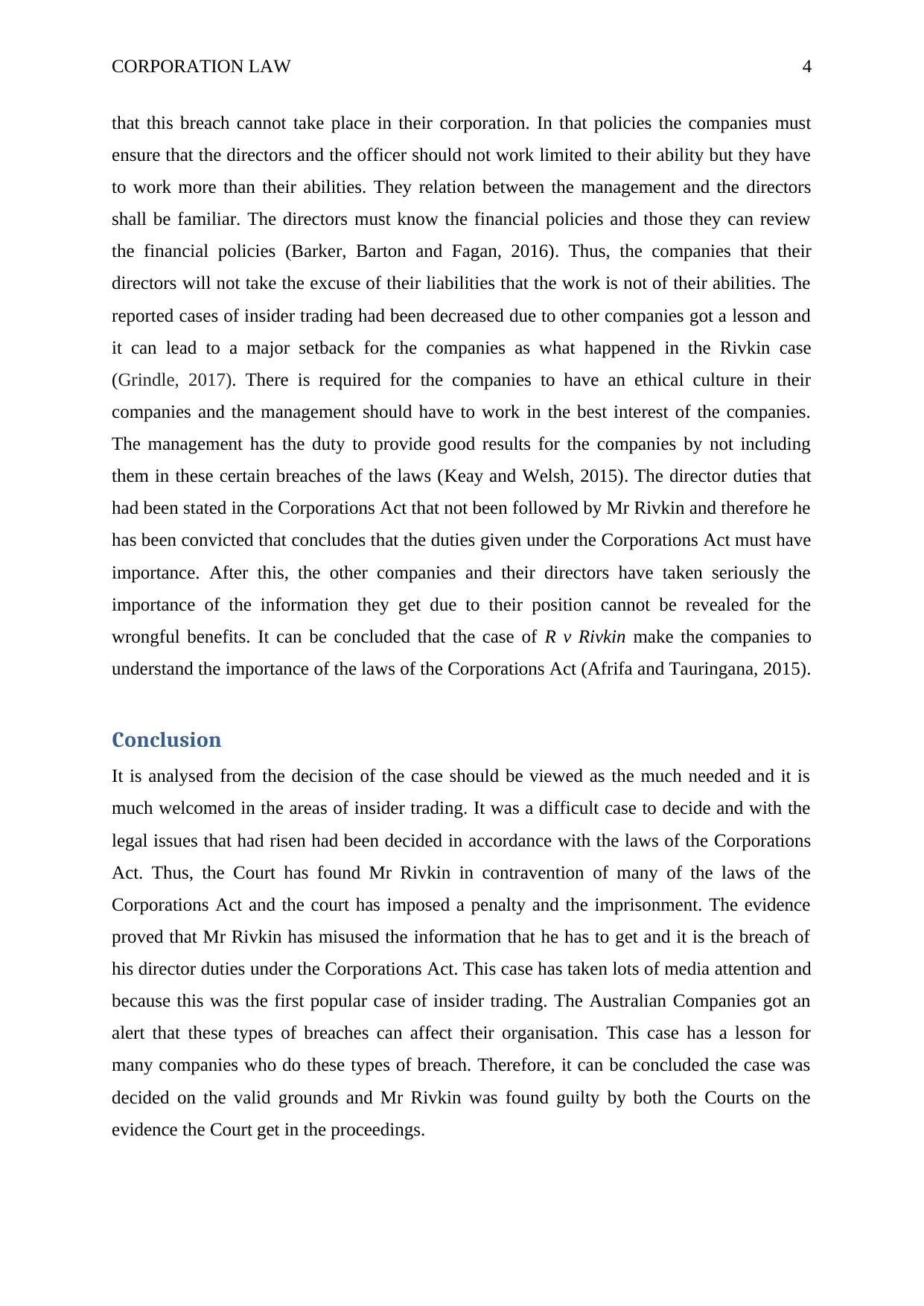
CORPORATION LAW 4
that this breach cannot take place in their corporation. In that policies the companies must
ensure that the directors and the officer should not work limited to their ability but they have
to work more than their abilities. They relation between the management and the directors
shall be familiar. The directors must know the financial policies and those they can review
the financial policies (Barker, Barton and Fagan, 2016). Thus, the companies that their
directors will not take the excuse of their liabilities that the work is not of their abilities. The
reported cases of insider trading had been decreased due to other companies got a lesson and
it can lead to a major setback for the companies as what happened in the Rivkin case
(Grindle, 2017). There is required for the companies to have an ethical culture in their
companies and the management should have to work in the best interest of the companies.
The management has the duty to provide good results for the companies by not including
them in these certain breaches of the laws (Keay and Welsh, 2015). The director duties that
had been stated in the Corporations Act that not been followed by Mr Rivkin and therefore he
has been convicted that concludes that the duties given under the Corporations Act must have
importance. After this, the other companies and their directors have taken seriously the
importance of the information they get due to their position cannot be revealed for the
wrongful benefits. It can be concluded that the case of R v Rivkin make the companies to
understand the importance of the laws of the Corporations Act (Afrifa and Tauringana, 2015).
Conclusion
It is analysed from the decision of the case should be viewed as the much needed and it is
much welcomed in the areas of insider trading. It was a difficult case to decide and with the
legal issues that had risen had been decided in accordance with the laws of the Corporations
Act. Thus, the Court has found Mr Rivkin in contravention of many of the laws of the
Corporations Act and the court has imposed a penalty and the imprisonment. The evidence
proved that Mr Rivkin has misused the information that he has to get and it is the breach of
his director duties under the Corporations Act. This case has taken lots of media attention and
because this was the first popular case of insider trading. The Australian Companies got an
alert that these types of breaches can affect their organisation. This case has a lesson for
many companies who do these types of breach. Therefore, it can be concluded the case was
decided on the valid grounds and Mr Rivkin was found guilty by both the Courts on the
evidence the Court get in the proceedings.
that this breach cannot take place in their corporation. In that policies the companies must
ensure that the directors and the officer should not work limited to their ability but they have
to work more than their abilities. They relation between the management and the directors
shall be familiar. The directors must know the financial policies and those they can review
the financial policies (Barker, Barton and Fagan, 2016). Thus, the companies that their
directors will not take the excuse of their liabilities that the work is not of their abilities. The
reported cases of insider trading had been decreased due to other companies got a lesson and
it can lead to a major setback for the companies as what happened in the Rivkin case
(Grindle, 2017). There is required for the companies to have an ethical culture in their
companies and the management should have to work in the best interest of the companies.
The management has the duty to provide good results for the companies by not including
them in these certain breaches of the laws (Keay and Welsh, 2015). The director duties that
had been stated in the Corporations Act that not been followed by Mr Rivkin and therefore he
has been convicted that concludes that the duties given under the Corporations Act must have
importance. After this, the other companies and their directors have taken seriously the
importance of the information they get due to their position cannot be revealed for the
wrongful benefits. It can be concluded that the case of R v Rivkin make the companies to
understand the importance of the laws of the Corporations Act (Afrifa and Tauringana, 2015).
Conclusion
It is analysed from the decision of the case should be viewed as the much needed and it is
much welcomed in the areas of insider trading. It was a difficult case to decide and with the
legal issues that had risen had been decided in accordance with the laws of the Corporations
Act. Thus, the Court has found Mr Rivkin in contravention of many of the laws of the
Corporations Act and the court has imposed a penalty and the imprisonment. The evidence
proved that Mr Rivkin has misused the information that he has to get and it is the breach of
his director duties under the Corporations Act. This case has taken lots of media attention and
because this was the first popular case of insider trading. The Australian Companies got an
alert that these types of breaches can affect their organisation. This case has a lesson for
many companies who do these types of breach. Therefore, it can be concluded the case was
decided on the valid grounds and Mr Rivkin was found guilty by both the Courts on the
evidence the Court get in the proceedings.
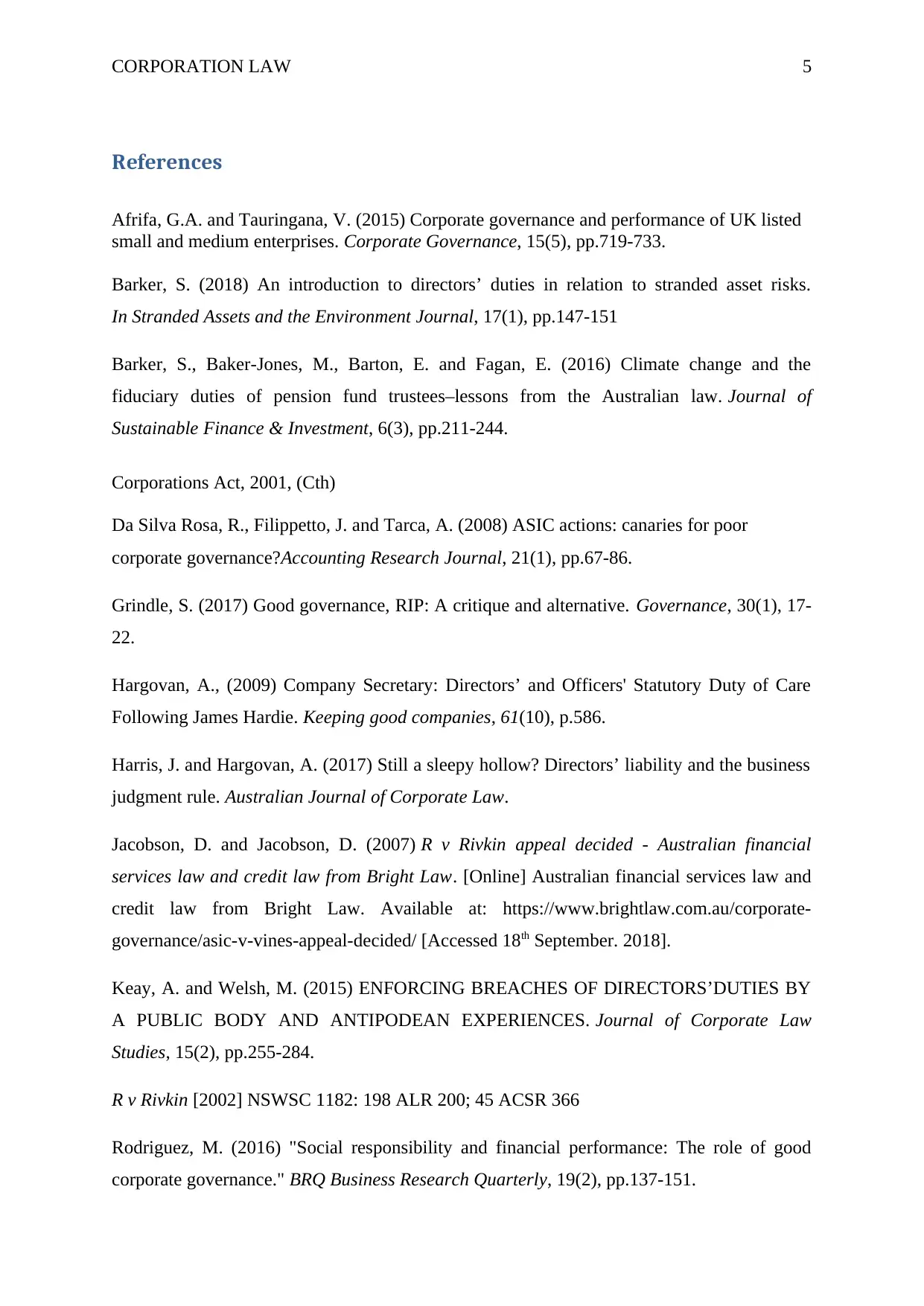
CORPORATION LAW 5
References
Afrifa, G.A. and Tauringana, V. (2015) Corporate governance and performance of UK listed
small and medium enterprises. Corporate Governance, 15(5), pp.719-733.
Barker, S. (2018) An introduction to directors’ duties in relation to stranded asset risks.
In Stranded Assets and the Environment Journal, 17(1), pp.147-151
Barker, S., Baker-Jones, M., Barton, E. and Fagan, E. (2016) Climate change and the
fiduciary duties of pension fund trustees–lessons from the Australian law. Journal of
Sustainable Finance & Investment, 6(3), pp.211-244.
Corporations Act, 2001, (Cth)
Da Silva Rosa, R., Filippetto, J. and Tarca, A. (2008) ASIC actions: canaries for poor
corporate governance?Accounting Research Journal, 21(1), pp.67-86.
Grindle, S. (2017) Good governance, RIP: A critique and alternative. Governance, 30(1), 17-
22.
Hargovan, A., (2009) Company Secretary: Directors’ and Officers' Statutory Duty of Care
Following James Hardie. Keeping good companies, 61(10), p.586.
Harris, J. and Hargovan, A. (2017) Still a sleepy hollow? Directors’ liability and the business
judgment rule. Australian Journal of Corporate Law.
Jacobson, D. and Jacobson, D. (2007) R v Rivkin appeal decided - Australian financial
services law and credit law from Bright Law. [Online] Australian financial services law and
credit law from Bright Law. Available at: https://www.brightlaw.com.au/corporate-
governance/asic-v-vines-appeal-decided/ [Accessed 18th September. 2018].
Keay, A. and Welsh, M. (2015) ENFORCING BREACHES OF DIRECTORS’DUTIES BY
A PUBLIC BODY AND ANTIPODEAN EXPERIENCES. Journal of Corporate Law
Studies, 15(2), pp.255-284.
R v Rivkin [2002] NSWSC 1182: 198 ALR 200; 45 ACSR 366
Rodriguez, M. (2016) "Social responsibility and financial performance: The role of good
corporate governance." BRQ Business Research Quarterly, 19(2), pp.137-151.
References
Afrifa, G.A. and Tauringana, V. (2015) Corporate governance and performance of UK listed
small and medium enterprises. Corporate Governance, 15(5), pp.719-733.
Barker, S. (2018) An introduction to directors’ duties in relation to stranded asset risks.
In Stranded Assets and the Environment Journal, 17(1), pp.147-151
Barker, S., Baker-Jones, M., Barton, E. and Fagan, E. (2016) Climate change and the
fiduciary duties of pension fund trustees–lessons from the Australian law. Journal of
Sustainable Finance & Investment, 6(3), pp.211-244.
Corporations Act, 2001, (Cth)
Da Silva Rosa, R., Filippetto, J. and Tarca, A. (2008) ASIC actions: canaries for poor
corporate governance?Accounting Research Journal, 21(1), pp.67-86.
Grindle, S. (2017) Good governance, RIP: A critique and alternative. Governance, 30(1), 17-
22.
Hargovan, A., (2009) Company Secretary: Directors’ and Officers' Statutory Duty of Care
Following James Hardie. Keeping good companies, 61(10), p.586.
Harris, J. and Hargovan, A. (2017) Still a sleepy hollow? Directors’ liability and the business
judgment rule. Australian Journal of Corporate Law.
Jacobson, D. and Jacobson, D. (2007) R v Rivkin appeal decided - Australian financial
services law and credit law from Bright Law. [Online] Australian financial services law and
credit law from Bright Law. Available at: https://www.brightlaw.com.au/corporate-
governance/asic-v-vines-appeal-decided/ [Accessed 18th September. 2018].
Keay, A. and Welsh, M. (2015) ENFORCING BREACHES OF DIRECTORS’DUTIES BY
A PUBLIC BODY AND ANTIPODEAN EXPERIENCES. Journal of Corporate Law
Studies, 15(2), pp.255-284.
R v Rivkin [2002] NSWSC 1182: 198 ALR 200; 45 ACSR 366
Rodriguez, M. (2016) "Social responsibility and financial performance: The role of good
corporate governance." BRQ Business Research Quarterly, 19(2), pp.137-151.
⊘ This is a preview!⊘
Do you want full access?
Subscribe today to unlock all pages.

Trusted by 1+ million students worldwide
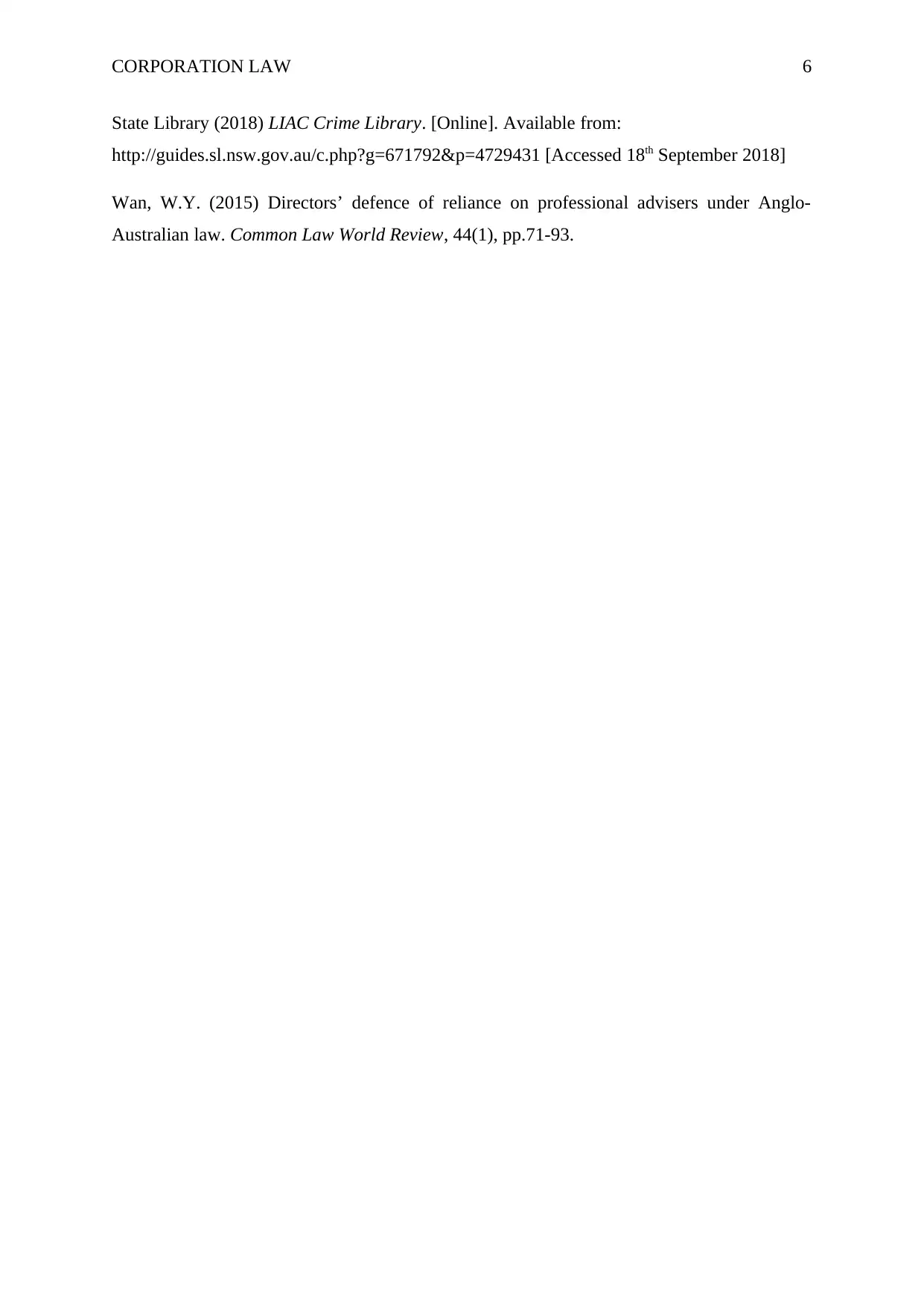
CORPORATION LAW 6
State Library (2018) LIAC Crime Library. [Online]. Available from:
http://guides.sl.nsw.gov.au/c.php?g=671792&p=4729431 [Accessed 18th September 2018]
Wan, W.Y. (2015) Directors’ defence of reliance on professional advisers under Anglo-
Australian law. Common Law World Review, 44(1), pp.71-93.
State Library (2018) LIAC Crime Library. [Online]. Available from:
http://guides.sl.nsw.gov.au/c.php?g=671792&p=4729431 [Accessed 18th September 2018]
Wan, W.Y. (2015) Directors’ defence of reliance on professional advisers under Anglo-
Australian law. Common Law World Review, 44(1), pp.71-93.
1 out of 7
Related Documents
Your All-in-One AI-Powered Toolkit for Academic Success.
+13062052269
info@desklib.com
Available 24*7 on WhatsApp / Email
![[object Object]](/_next/static/media/star-bottom.7253800d.svg)
Unlock your academic potential
Copyright © 2020–2026 A2Z Services. All Rights Reserved. Developed and managed by ZUCOL.
![Case Study of R v Rivkin [2002] on Insider Trading & Corporations Law](/_next/image/?url=https%3A%2F%2Fdesklib.com%2Fmedia%2Fr-v-rivkin-landmark-case-australian-insider-trading-law_page_2.jpg&w=256&q=75)




